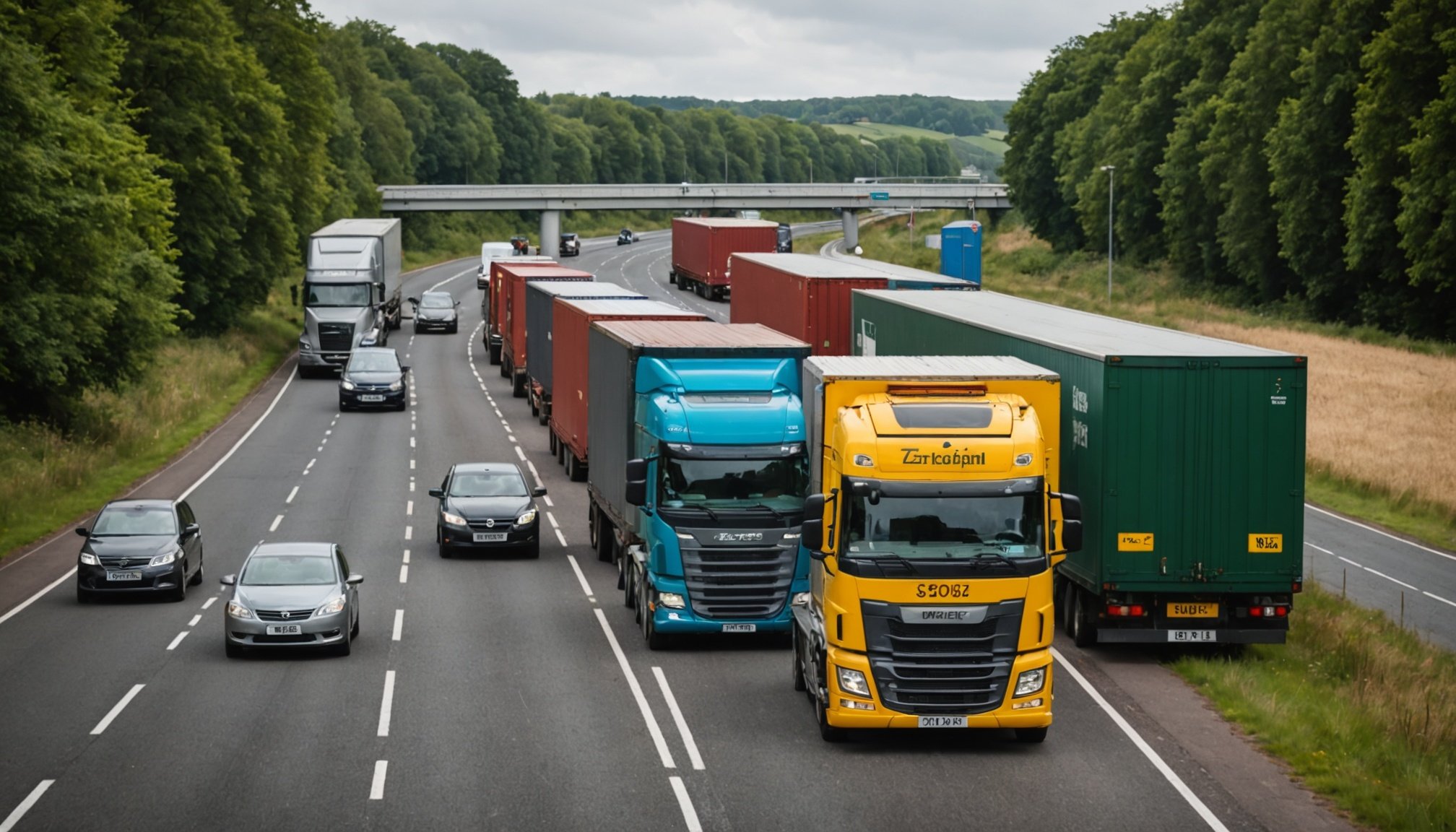Overview of AI and Machine Learning in Logistics
The integration of AI in logistics is revolutionising the industry by enhancing both efficiency and accuracy. Artificial intelligence (AI) refers to the simulation of human intelligence in machines, enabling them to perform tasks that typically require human cognition. In logistics, it optimises processes such as route planning, demand forecasting, and stock management, thus significantly improving supply chain operations.
Machine learning applications further reinforce logistics by providing data-driven insights and predictive analytics. This aspect of AI involves algorithms learning from past data to make informed decisions autonomously. For example, it can predict consumer demand patterns and adjust supply chain practices accordingly, leading to reduced costs and increased delivery speed.
Have you seen this : Maximizing revenue and minimizing returns: how virtual try-on technology transforms uk retailers
Several current trends are reshaping the landscape of UK supply chains:
- Increased adoption of AI-driven robotics for automating warehouse operations.
- Implementation of smart contracts via blockchain technology to ensure transparency.
- Growth of e-commerce demanding faster and more reliable delivery services.
These advancements not only streamline logistics operations but also address complex challenges. By implementing AI and machine learning, businesses are well-equipped to adapt to the evolving demands of global markets while maintaining a competitive edge.
This might interest you : Empowering uk smes: leveraging cloud computing for enhanced scalability and operational efficiency
Techniques for Route Optimization
To enhance route optimization, diverse strategies leveraging technology and data are essential. These include machine learning algorithms and advanced AI methodologies, each contributing uniquely to streamlining logistics.
Predictive Analytics for Demand Forecasting
Predictive analytics plays a crucial role in anticipating demand surges and optimizing supply chain operations. By utilizing historical data, these analytics guide decision-makers in anticipating customer needs and adjusting logistics accordingly.
Dynamic Routing Algorithms
Dynamic routing algorithms are pivotal in ensuring efficient delivery routes. These algorithms adapt to changing conditions, such as traffic congestion or road closures, thereby optimizing real-time decision-making.
Real-time Traffic Analysis
The integration of real-time traffic analysis in logistics cannot be overstated. By accessing live traffic data, logistics systems can dynamically adjust routes, minimizing delivery delays and enhancing efficiency.
Incorporating these route optimization techniques facilitates a responsive and flexible supply chain, addressing unforeseen circumstances with precision. The adaptability of AI methodologies in handling dynamic conditions exemplifies their importance in modern logistics, ensuring timely and efficient delivery outcomes.
Case Studies from UK Supply Chains
Delving into UK supply chain case studies reveals transformative changes as organisations embraced AI, highlighting remarkable logistics innovation examples. Consider the success story of a leading British retailer. They strategically integrated AI algorithms to enhance their logistics network. This resulted in efficient route optimisation, reducing delivery times by up to 25%.
Another notable case includes a major logistics company that employed AI to refine predictive analytics for inventory management. By doing so, they witnessed a significant decrease in overstock situations and improved their just-in-time delivery model. These implementations demonstrate AI’s potency in elevating operational efficiency.
Key metrics from these case studies reflect tangible benefits: decreased fuel costs, enhanced customer satisfaction, and notably, a 20% uptick in overall supply chain agility. Through detailed data analysis and strategic planning, companies have unlocked new milestones in cost reduction and process optimisation.
These AI success stories set a precedent for organisations seeking to streamline logistics. By adopting similar strategies, firms stand to gain not only in efficiency but also in fostering innovative practices that drive long-term growth.
Statistical Benefits of AI in Logistics
Implementing AI in logistics provides a multitude of efficiencies, revolutionising how businesses operate. Significant logistics performance improvements are observed through using AI technologies, which streamline operations and optimise resources.
Efficiency Gains Achieved Through AI
AI technologies enable companies to achieve marked efficiency gains by automating routine tasks and facilitating smart decision-making processes. For instance, AI-driven data analytics offers real-time insights, helping logistics managers optimize routes for better performance metrics. This results in enhanced delivery processes and increases overall operational efficiency in logistics.
Reduction in Delivery Times
A crucial benefit identified is the reduction in delivery times. AI algorithms analyse delivery routes and identify the fastest paths, factoring in traffic conditions and weather patterns. As a result, businesses notice a reduction in delivery times, significantly enhancing customer satisfaction.
Cost Efficiency Metrics
AI’s impact on cost savings in supply chains is profound. Companies using AI report notable decreases in operational costs due to reduced fuel expenses and lower labour costs associated with efficiency gains. Comparative data showcases that AI-enhanced logistics consistently outperform traditional methods, highlighting the financial benefits. Case studies further illustrate these cost efficiencies, demonstrating the potential ROI for companies adopting AI technologies.
Challenges and Solutions in Implementing AI
Implementing AI technologies often hits roadblocks, primarily due to AI implementation challenges. Companies commonly face issues related to logistics and technological barriers, leading to integration difficulties. The data quality can be a significant stumbling block. Accurate, high-quality data is crucial for AI to function effectively. However, many organisations struggle with data that is fragmented or incomplete.
Another barrier is integration issues. Organisations sometimes find it difficult to incorporate AI technologies into existing systems. This challenge is often due to compatibility problems or resistance from staff who are not accustomed to AI tools.
To address these challenges, companies can adopt several strategies for successful AI integration:
- Invest in improving data infrastructure and management to ensure high data quality.
- Foster a culture of learning and acceptance through training programmes to ease staff into new technologies.
- Collaborate with AI experts to tailor solutions that fit seamlessly into current systems.
Implementing AI does require navigating complex terrain, but with strategic planning and adaptability, these challenges can be effectively managed. Companies can unlock significant benefits by embracing practical solutions for AI integration.
Expert Opinions on AI and Machine Learning in Logistics
Exploring the realms of logistics, industry leaders share invaluable insights into how AI and machine learning are revolutionising the field. Logistics experts insights often reveal that the integration of AI technology significantly enhances efficiency and accuracy.
Interviews with Industry Leaders
Esteemed industry leaders provide a wealth of knowledge through their experiences. For instance, many highlight how AI thought leadership drives new strategies that redefine supply chain operations. Leaders express that AI technologies streamline processes, minimising human error and optimising resource allocation.
Insights from AI and Logistics Experts
Experts unanimously agree on the transformative potential of AI in logistics. They stress that implementing AI leads to improved data analysis and decision-making. Furthermore, industry expert perspectives suggest that early adopters of machine learning can gain a competitive edge, thanks to streamlined operations and better insights into consumer demand.
Predictions for the Future of Logistics Innovation
Looking ahead, thought leaders predict that AI will continue to drive significant innovations within the logistics sector. They foresee increased automation, which will redefine traditional roles and open up new avenues for logistics experts insights. Additionally, experts recommend businesses proactively explore AI and machine learning to harness future benefits and enhance supply chain resilience.











